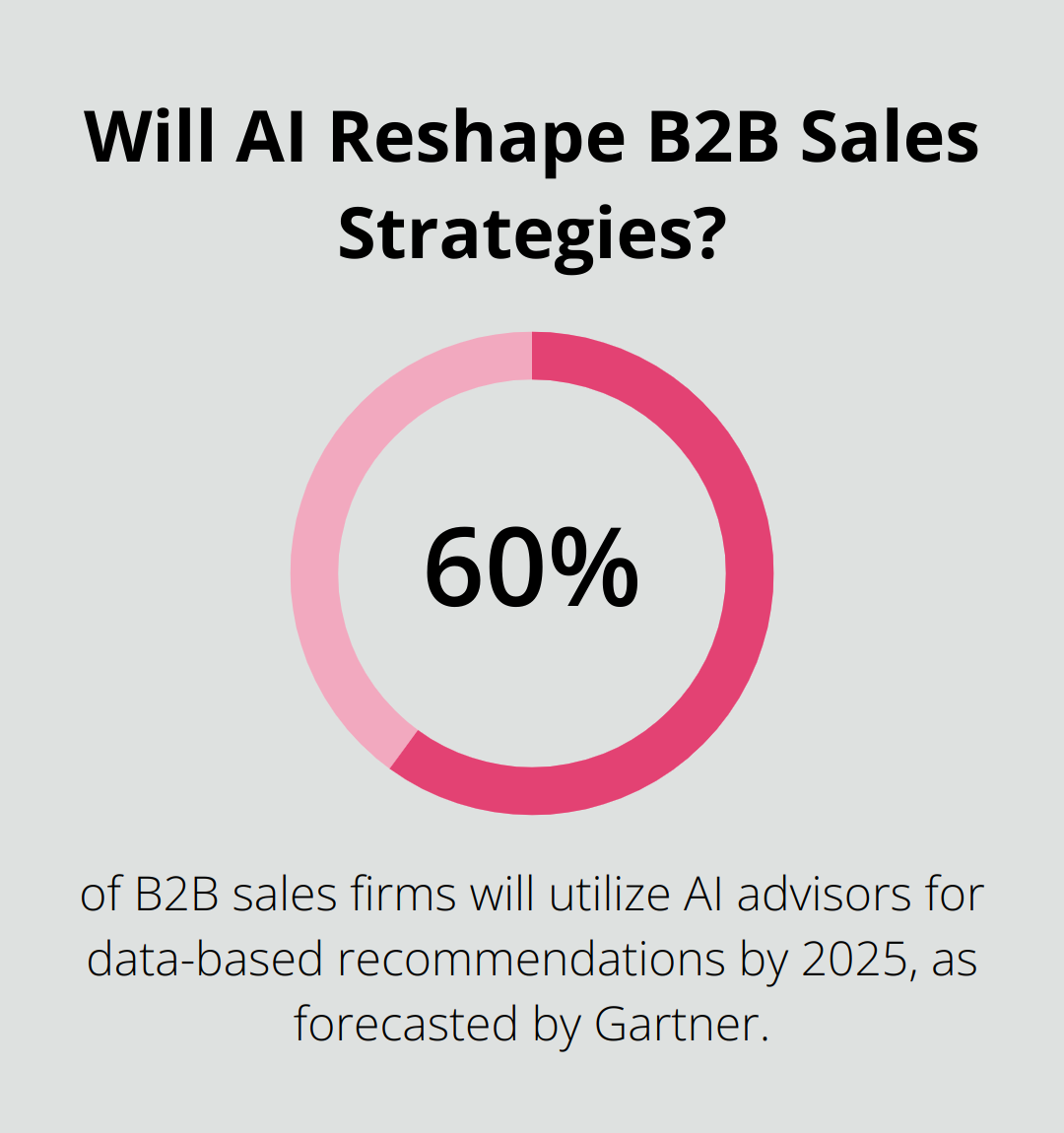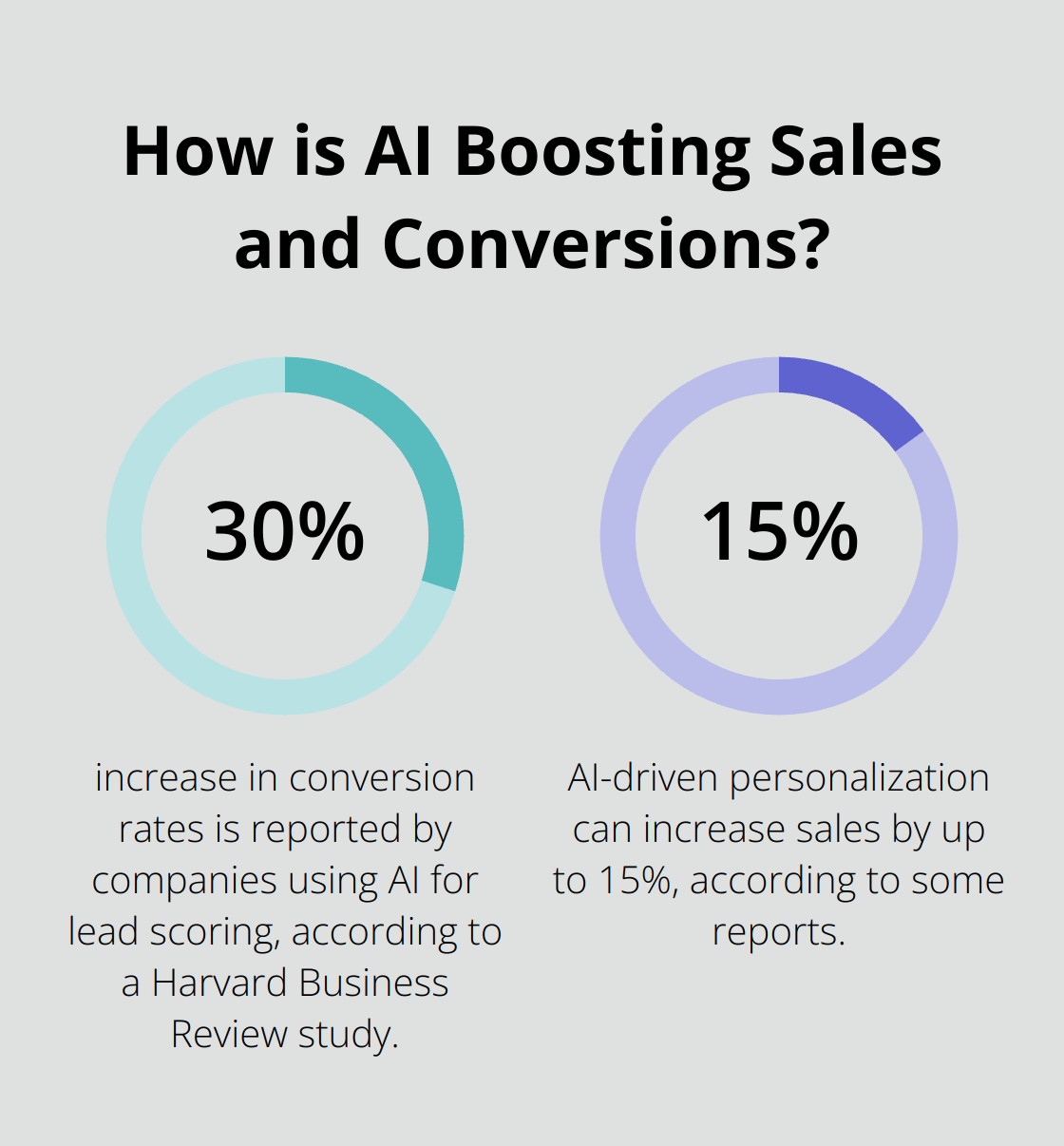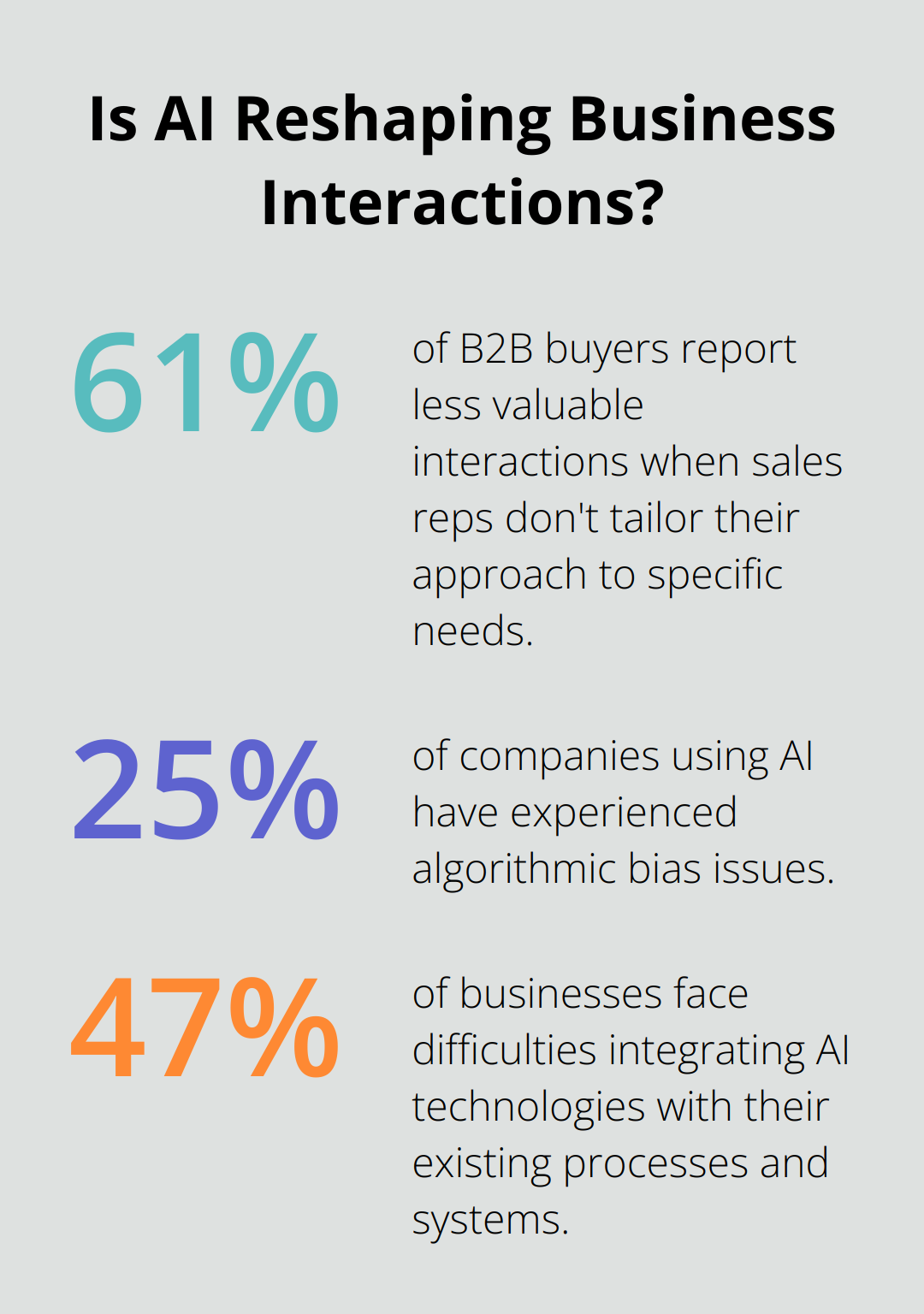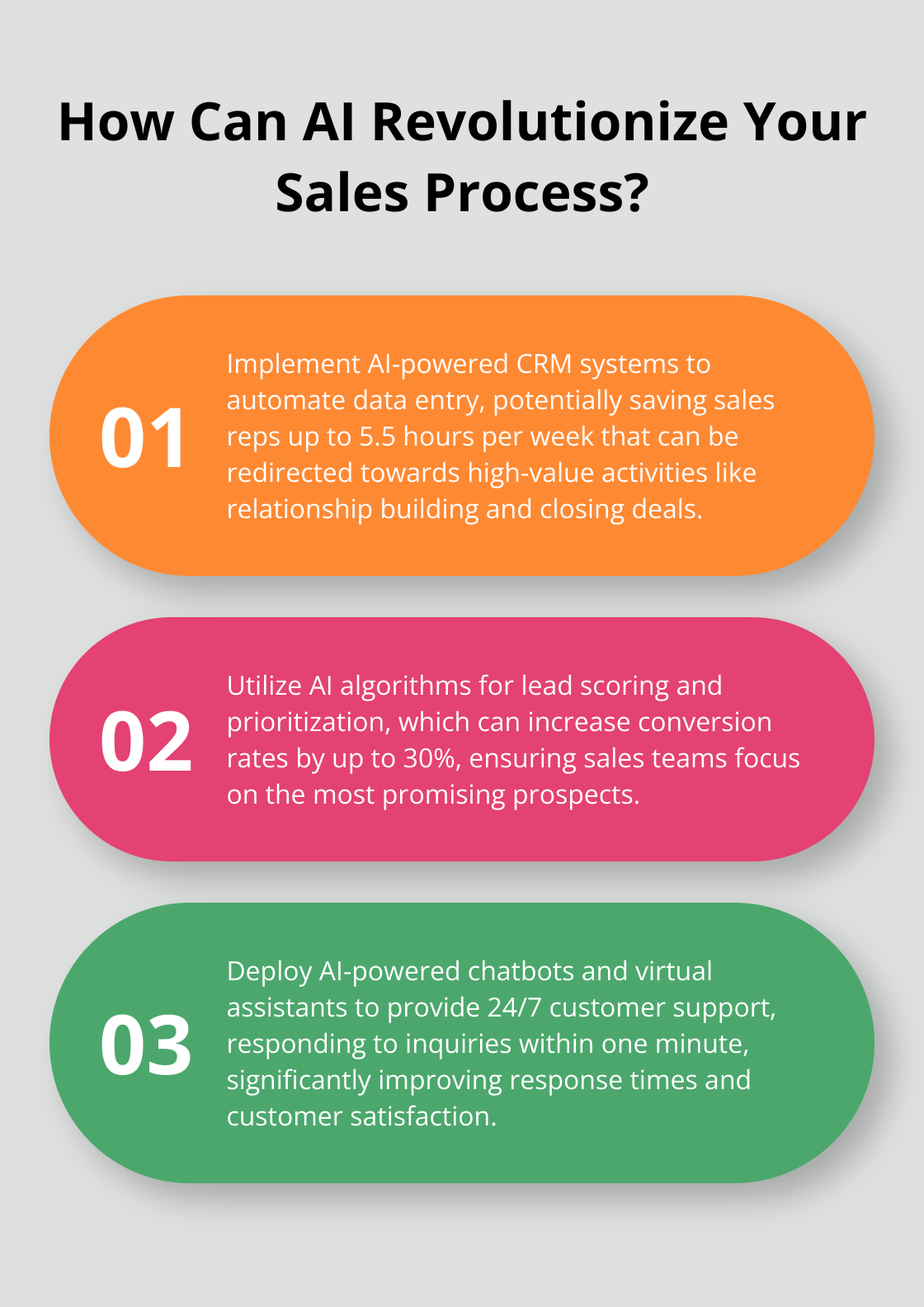At Help Reply, we’re witnessing a seismic shift in the sales landscape. The question on everyone’s mind: Can AI replace sales teams?
This blog post dives into the current state of AI in sales, exploring its advantages and limitations. We’ll examine how businesses can strike the right balance between artificial intelligence and human expertise in their sales strategies.
AI in Sales Today
The landscape of sales is undergoing a rapid transformation, with artificial intelligence (AI) taking center stage. This shift is reshaping sales processes and customer interactions in unprecedented ways.
AI-Powered Sales Tools
Modern sales teams now have access to a wide array of AI-powered tools. These include chatbots for initial customer inquiries and sophisticated analytics platforms that predict customer behavior. Salesforce’s Einstein AI, for example, analyzes vast amounts of data to provide sales reps with actionable insights. Similarly, Gong.io uses AI to analyze sales calls and offer coaching tips.
AI Applications in Sales Processes
AI transforms various aspects of the sales cycle. Lead scoring algorithms now use machine learning to identify the most promising prospects, which significantly improves conversion rates. Predictive analytics tools forecast sales trends with remarkable accuracy, allowing teams to adjust strategies proactively. AI-driven content recommendation engines enhance modern recommender systems’ accuracy, efficiency, and personalization features using machine learning.
Adoption Rates and Impact
The adoption of AI in sales departments continues to accelerate. A recent McKinsey study suggests that AI has the potential to automate up to 50% of current sales activities. This doesn’t necessarily mean job losses, but rather a shift in focus for sales professionals. In fact, Gartner forecasts that 60% of B2B sales firms will utilize AI advisors for data-based recommendations by 2025.

The impact of AI on sales performance is significant. Companies using AI for sales report an average increase of 50% in leads and appointments, 60-70% cost reduction, and 40-60% increase in productivity. These numbers underscore the transformative potential of AI in sales.
However, AI is not a magic solution. Its effectiveness depends on the quality of data it’s fed and how well it integrates into existing sales processes. Moreover, while AI excels at data analysis and routine tasks, it still struggles with the nuanced, emotional aspects of sales that human professionals excel at.
As we look to the future of sales, the key to success will likely lie in finding the right balance between AI capabilities and human skills. AI doesn’t replace human salespeople; it amplifies their abilities. This synergy between AI and human expertise represents the true potential of modern sales.
The next chapter will explore the specific advantages that AI brings to the sales process, including improved efficiency, enhanced customer insights, and round-the-clock availability.
How AI Supercharges Sales Performance
Efficiency and Productivity Boost
AI-powered tools revolutionize sales team efficiency. AI-driven CRM systems automate data entry, which saves sales reps up to 5.5 hours per week. This time can be redirected towards high-value activities like relationship building and closing deals. AI algorithms also prioritize leads, ensuring sales teams focus on the most promising prospects. Companies that use AI for lead scoring report up to a 30% increase in conversion rates (according to a Harvard Business Review study).
Deep Customer Insights
AI analyzes vast amounts of customer data with unparalleled speed and accuracy. It processes millions of data points in seconds, uncovering patterns and preferences that would take humans months to identify. This leads to hyper-personalized sales approaches. AI helps identify trends in customer behavior and allows businesses to address particular customer needs in order to personalize the shopping experience. Some reports suggest that AI-driven personalization can increase sales by up to 15%.
24/7 Sales Support
AI provides round-the-clock support, which is a significant advantage in sales. AI-powered chatbots and virtual assistants handle customer inquiries at any time, ensuring no lead goes unattended. This constant availability is essential in today’s fast-paced business environment. Some AI solutions respond to customer emails within one minute, 24/7, which significantly improves response times and customer satisfaction.
Seamless Scaling of Sales Operations
AI enables sales teams to scale their operations without a proportional increase in resources. As a business grows, AI can handle an increasing volume of inquiries and leads without compromising on quality or response time. This scalability is particularly valuable for businesses experiencing rapid growth or seasonal fluctuations in demand.

The advantages of AI in sales are clear and compelling. From boosting efficiency to providing deep customer insights and enabling round-the-clock support, AI becomes an indispensable tool in the modern sales arsenal. However, it’s important to note that AI doesn’t replace human salespeople; it amplifies their abilities. Instead, it’s a powerful tool that enhances human capabilities, allowing sales professionals to focus on what they do best: building relationships and closing deals.
While the benefits of AI in sales are significant, it’s equally important to understand its limitations and challenges. The next section will explore these aspects to provide a balanced view of AI’s role in the sales process.
The Human Element AI Can’t Replace
The Empathy Gap
AI revolutionizes sales, but it fails to replicate human empathy. Human salespeople excel at interpreting emotional cues, adapting their approach in real-time, and establishing genuine connections. AI lacks the emotional intelligence to fully engage with customers on a personal level.

A PwC study reveals that consumers prefer human interaction over AI systems for higher-risk activities. This preference underscores the importance of maintaining a human touch in sales interactions.
Navigating Complex Scenarios
AI handles routine inquiries and predictable situations well, but it struggles with complex or unique scenarios. Sales often involve nuanced negotiations, unexpected objections, or situations that require creative problem-solving. These areas showcase human intuition and experience.
In B2B sales, where deals involve multiple stakeholders and intricate decision-making processes, AI often falls short. A Gartner survey found that 61% of B2B buyers report less valuable interactions when sales reps don’t tailor their approach to specific needs.
The Bias Blindspot
AI algorithms reflect the quality of their training data. Biased data leads to biased decision-making, potentially resulting in unfair treatment of customer segments or missed opportunities.
An MIT Sloan Management Review report highlighted that 25% of companies using AI have experienced algorithmic bias issues. This emphasizes the need for constant monitoring and adjustment of AI systems to ensure fair and ethical operations.
Implementation Hurdles
Integrating AI into existing sales processes presents challenges. Many businesses struggle with data quality, system compatibility, and employee adoption. A Deloitte survey found that 47% of businesses face difficulties integrating AI technologies with their existing processes and systems.
The cost of implementing and maintaining AI systems can strain resources, particularly for smaller businesses. The initial investment, ongoing maintenance, and need for specialized talent often prove prohibitive.
The Human-AI Balance
While AI offers numerous benefits to sales teams, it cannot fully replace the human element. The most effective approach uses AI as a tool to augment human capabilities. AI excels at data analysis, lead scoring, and routine tasks, allowing sales teams to focus on relationship-building, complex problem-solving, and deal closure.
Help Reply’s AI-powered solution works in tandem with human sales teams, enhancing their capabilities without attempting to replace the irreplaceable human touch. The system handles routine inquiries and provides rapid responses, freeing up human sales professionals to focus on high-value interactions and strategic decision-making.
Final Thoughts
AI will play a significant role in the future of sales, but it won’t replace human teams entirely. The question “Can AI replace sales?” overlooks the potential of combining AI efficiency with human expertise. This synergy allows sales professionals to focus on high-value activities while AI handles routine tasks.

Companies should implement AI solutions gradually, identifying areas where they provide the most value. It’s essential to train sales teams to work effectively with AI tools, ensuring they leverage these capabilities to enhance their performance. This approach maximizes the strengths of both AI and human sales professionals.
Help Reply’s AI-powered solution transforms sales and customer support by providing rapid responses and efficient inquiry handling. Businesses that find the right balance between AI efficiency and human expertise will create more effective, responsive, and personalized sales experiences. The future of sales lies in creating a powerful alliance between AI and human teams.


Leave a Reply